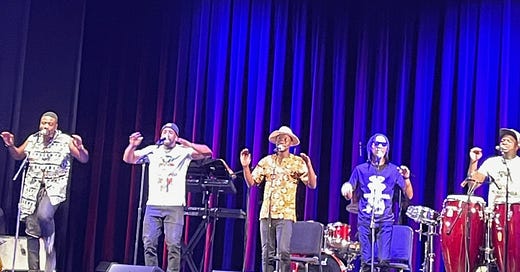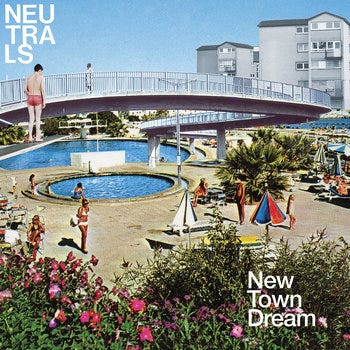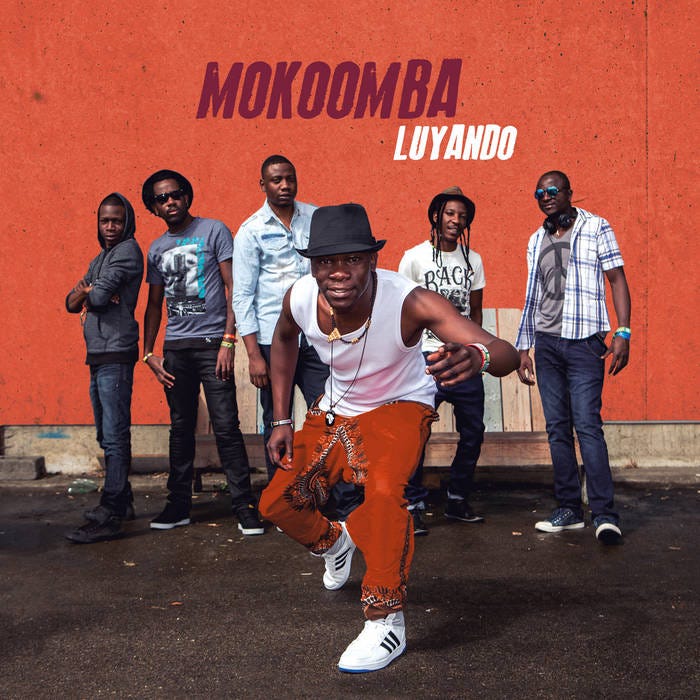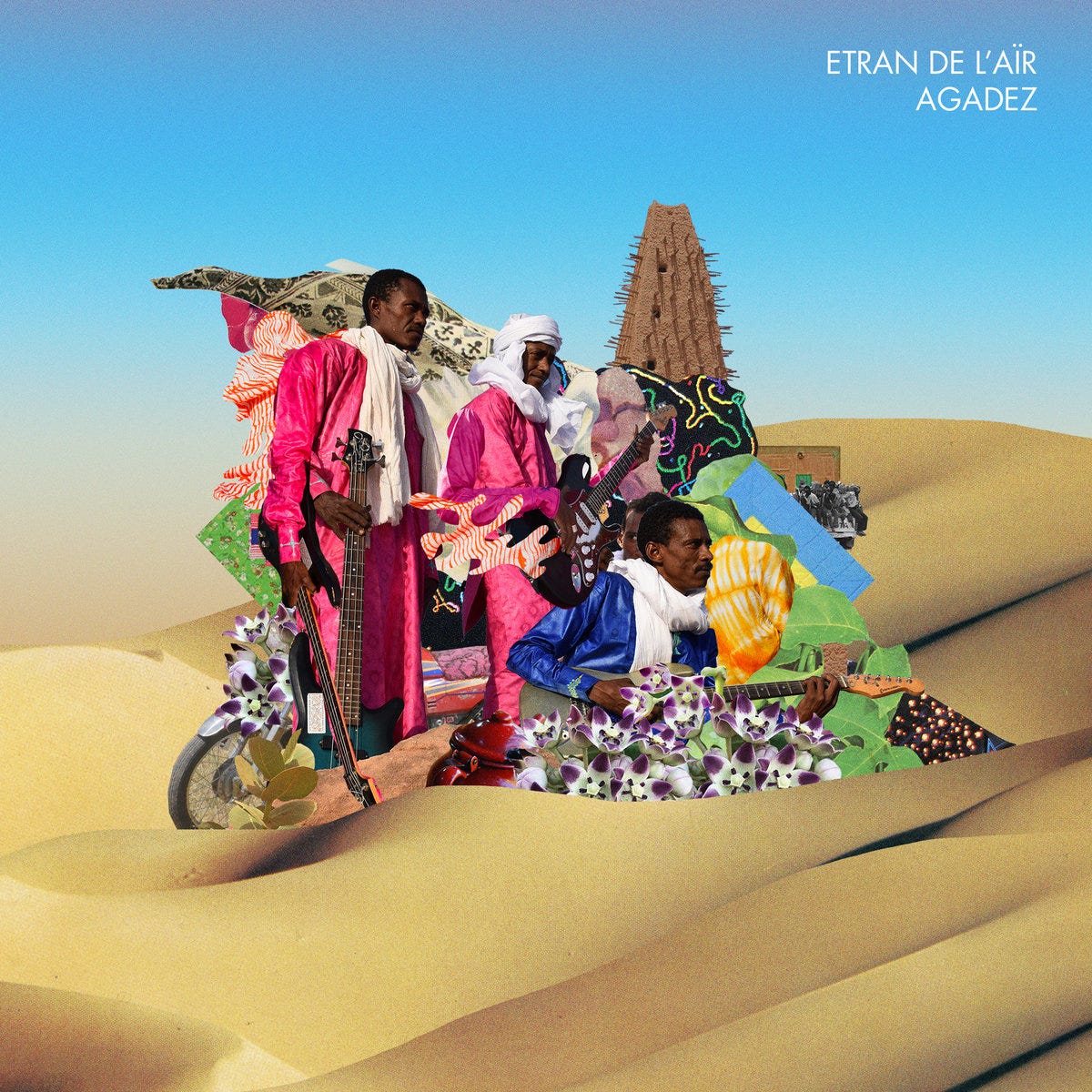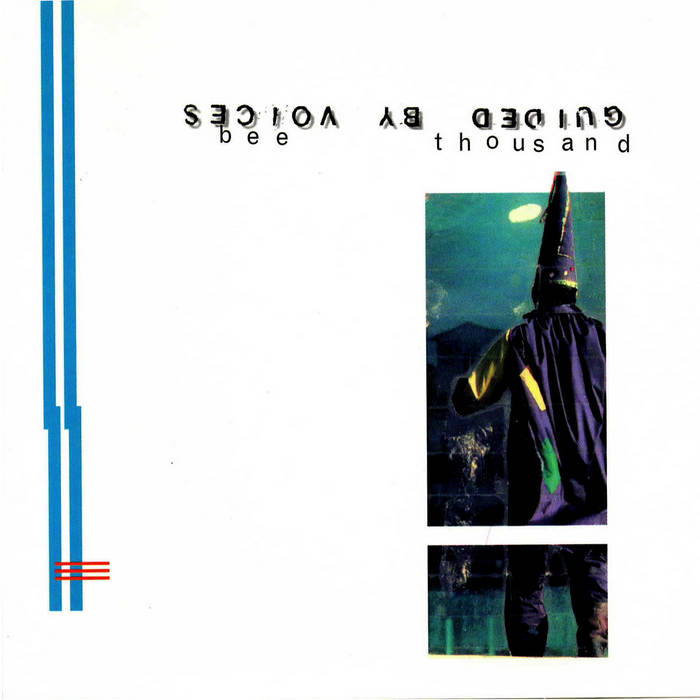The 6OGs Celebrate Other OGs: Neutrals, Guided by Voices, Mokoomba, and Etran de l'Air
Although this is a site written by self-declared Old Guys, we don’t often cover Old Guys in our writing. Mostly because old guys aren’t usually making the most interesting or review-worthy music or turning it up live like they may have in their (and our) younger days. But for this post, we focus on a great young-ish band with one old guy in their midst, two African bands that have been at it for ages, and a very personal reflection as an old guy on a veteran band of the indie rock scene that can still churn out records and live shows at a pace that would make their younger and less-alcohol-soaked peers’ heads spin (and probably from a hangover).
New album: New Town Dream by Neutrals. There must be something in the water in the Bay Area. A few months ago, I wrote about Fairweather Friend, a wonderful jangle-pop album by the San Francisco-based band The Umbrellas that instantly became a candidate for one of my favorites of the year. And now we have New Town Dream, another wonderful jangle-pop album, this time by the Oakland-based band Neutrals, Slumberland Records label-mates of the Umbrellas. Neutrals’ latest album is clearly hitting my sweet spot – an updated twist on early ‘80s/’90s guitar pop with lyrics that veer from cutting to playful, and with most tracks clocking in at three minutes or less. New Town Dream is an absolute joy from the first listen and another album that I expect to feature prominently on my year-end favorites list.
Neutrals are a trio of Bay Area music veterans – guitarist/singer Allan McNaughton, who describes himself as Oakland/SF-by-way-of-Glasgow (formerly of the post-punk bands Giant Haystacks and Airfix Kits), and the husband-wife rhythm section of drummer Phil Lantz (also formerly of Airfix Kits) and bassist Lauren Matsui (who also plays guitar and sings for the excellent seablite, which shares a similar ‘80s/’90s indie guitar pop sensibility with Neutrals, but adds a shoegaze influence to the mix; check out their 2023 release Lemon Lights). Even though New Town Dream is more guitar pop and less post-punk, after several listens, I heard the raw aggression from McNaughton’s Giant Haystacks recordings coming through in the new songs.
New Town Dream is an absolute joy from the first listen and another album that I expect to feature prominently on my year-end favorites list.
The album opens with the largely instrumental “New Town Dream (Version).” The music is mid-tempo, led prominently by Matsui’s bass line, and while there are no lyrics, the song plays over a recording of a TV news report (or a film, or an advertisement, or a speech, I’m not really sure) about Scotland’s New Towns, which were built after World War II (as one of the recordings called them, “the creation of the postwar dream”) and designed to ease overcrowding in Scottish cities, particularly Glasgow. While this brief introduction sets up the album’s focus on life in these New Towns, particularly during McNaughton’s youth in the ‘70s (as an indie rocker in his 50s he’s older than his bandmates and fits squarely in the 6OG demographic) the themes of these songs will sound familiar to anyone who grew up in an American suburb.
From there, the album kicks into gear. The next track, “That’s Him on the Daft Stuff Again,” starts with six great seconds of Lantz’s forceful drumming and Matsui’s melodic bass, right before McNaughton jumps in with churning guitar chords (think “She Bangs the Drums” but with, you know, more drums). McNaughton’s lyrics are blunt, and the song is about exactly what you’d expect it would be about (“People come and go at all times of the night / His mother was a failure when she tried to keep him right”). “The Iron that Never Swung” also begins with a terrific rhythm section solo followed by aggressive jangly guitar chords and is probably the best song I’ve ever heard about a golf course that was promised but never built (“All the effort was in vain / We lost our land to eminent domain / Where there should have been a fairway / They canceled, put a new motorway”). “Stop the Bypass” covers similar lyrical territory, with McNaughton and Matsui singing “Don’t want your city bypass / Don’t want your motorway.”
“Wish You Were Here” represents the playful side of Neutrals and is reminiscent of The Wedding Present, from the opening chords to the lyrics about a woman on a Spanish beach vacation – there are references to “dancing and drinking sangria” – sending postcards to her boyfriend/husband Gary that start off well enough (“Two weeks in the sun and sand / All that’s missing is you by my side”) until we get to the last one in which she announces she’s staying there with her new beau (“Dear Gary, sorry this postcard is late / I’ll be quick, I don’t want to make Pedro wait / Please Gary, don’t try the phone”) punctuated perfectly by Matsui’s repeated backing vocals (“I’m not coming home”).
Several of the tracks are centered on characters representing the type of people who either go unnoticed or unappreciated in daily life. “Steven Proctor, Bus Conductor” features less aggressive jangly guitars, more akin to Reckoning-era R.E.M., and tells the tale of a bus driver who “suffers public abuse” while “choking on diesel fumes.” “Substitute Teacher” is about, well, a substitute teacher who’s into “amateur dramatics” (“He writes his name on the board / He’ll be gone tomorrow / The kids don’t wanna know”) and, with staccato surf-inspired guitars and jaunty keyboards, it sounds like The B-52’s circa “Private Idaho” merged with a minute-and-a-half of direct-but-absurd Robert Pollard-esque lyrics. And I absolutely mean that as a compliment.
Neutrals deviate from their regular musical style on “How Did I Get Here,” a spoken-word electro-beat number about a former DJ who’s now “just another paunchy middle aged ex-raver with nowhere to go“ hanging around the “yummy mommies with their all-inclusive cocktails.” It’s a surprising and satisfying interlude. “Phantom Arcade” is the longest song on the album, coming in at around four minutes, I guess making it the “Heart of the Sunrise” of New Town Dream (kidding – unlike any 11-minute Yes song, “Phantom Arcade is thoroughly enjoyable). The song tells the story of a man who steals the classic games from a closed arcade with the intent to re-sell, gets caught with some of the merchandise, and spends six months in prison, only to get out and find that the storage unit holding the rest of the stolen games has been demolished to build – you guessed it – a motorway. Album closer “Leisureland” also references the closed arcade, singing about the familiar theme of when there’s “not much to do around here after dark.”
The Bay Area has long been known for classic rock, jam bands, punk/ska/hardcore, hip hop, garage rock, and experimental art-rock. As a lifelong East Coaster, however, Oakland/SF has never been top of mind for jangly guitar pop. Rather, I usually thought of NY/NJ, Boston, Athens (GA), and more recently Philadelphia, along with UK locales like London, Manchester, and McNaughton’s home of Glasgow. But that’s me being influenced by my own biases, which equated “Bay Area rock band” with, for example, Dead Kennedys and Operation Ivy. It’s clear that Oakland and San Francisco have a vibrant guitar pop scene, thanks in large part to Slumberland. Neutrals are one of the standout bands in that scene and New Town Dream – with 13 songs coming in at a crisp 33 minutes – is one of the best albums I’ve heard this year. Now I can only hope that Neutrals, in the near future, will make their way east – to DC, in particular – for some shows. (Brian)
Album(s) from upcoming and recent live shows: Luyando by Mokoomba and Agadez by Etran de L’air. We are blessed in Washington, DC, with many things (and certainly cursed with plenty of others, but I suppose that’s we have political substacks for). One of the blessings is, of course, the Kennedy Center, but for me, it’s mainly the Millennium Stage, which hosts concerts every weeknight (and some weekends) at 6pm. FOR FREE. The artists range from local to global, as do the spectators; many are just stumbling onto a show as they check the KC off their tourist list. Many locals, like me, relish the chance to experience legends or up-and-comers at a reasonable hour (increasingly important for us old guys).
In June, Millennium Stage featured two veteran acts from different parts of Africa, whose sounds also could not be more different. In the United States, we tend, sadly, to think of Africa as a country and lump its myriad styles of music together in one category at a time. In the 70s and 80s, we thought of Fela Kuti-style Afrobeat, in the 90s it was Ladysmith Black Mambazo-esque vocal harmonies, and since the 2000s, it’s been the dominance of Afrobeats from West Africa and beyond.
Mokoomba from Victoria Falls in northern Zimbabwe describes its style as “Afro-fusion,” and that feels as apt as any description I have ever found for a band. With each record, Mokoomba, the core members of which began playing together in 2002, finds a different aspect of African music and tradition to explore. And the live show took the audience on the same journey: starting quietly with a single guitar, building to a more familiar Chimurenga-style Zimbabwean sound, then growing toward full Afrobeat and eventually finishing with a focus on the rhythms and vocal harmonizing reminiscent of Ladysmith.
As a record, Luyando stays mainly rooted in the guitar, as opener “Mokole” makes clear from the first notes. At the same time, “Mokole” introduces the harmonies that marks the versatility of what they can do. Title track “Luyando” expands the percussion sounds and rhythmic layers alongside a dazzling array of vocal sounds, from the harmonies of the whole band to lead singer Mathias Muzaza generating any number of woops, woots, and calls and then lowering his register to a deeper bass to join the band in a familiar approach that somehow still sounds new. “Vimbe” similarly allows Muzaza to expand his voice in a more direct style, while also having fun with imitating instruments, all while the band stays right behind him over top a pulsing rhythm. The record is a journey of musical styles, of vocal performances, and rhythms that keep you on your toes — always dancing but never quite sure what the dance will look like.
Etran de l'Air from Niger, on the other hand, is rooted in one style: Tuareg “desert blues.” A band of relatives who cut their teeth playing weddings and celebrations starting in the mid-1990s, their reputation has grown steadily, thanks in part to their presence on taste-making label (for this sound anyway) Sahel Sounds. The focus is on repetition, on trance, on drawing you into the sound so you can get forget about most everything else and just be in the moment. The Sahel can be a very demanding and trying place, especially amid current political dynamics, and the ability to lose yourself in the rhythm, in the textures, in the movements of where the band takes you is exactly what they are going for.
Their new record, “100% Sahara Guitar,” comes out on September 6, and the Millennium Stage show featured a few tracks from it (I think). But the standouts came from Agadez, and if you need to boil down the experience of the band to one song, for me, it’s “Nak Deranine.” The vocals layer in with the texture of the guitars, and you can feel and follow the secret weapon of the sound: the drummers. It’s hard to move past the captivating presence and performance of the guitar players in any good desert blues band, but if you can key in on the drummers, you’ll wonder how it is that there’s only one player. “Tarha Warghey Ichile” is the showstopper live, as it takes the tempo up, and by contrast “Tchingolene” is where you can catch your breath with just an extra beat of space.
If you’re not in DC or another major city, it can be hard to find these kinds of bands live. But if the opportunity arises in your area, take it without hesitation. Although Africa is indeed not a country, and the styles across the continent are almost innumerable, the common denominator is live performance. Whether it’s weddings, street performance, or dancehalls, live shows are how bands across the continent find their way and earn their livings — not to mention their reputations. Both Millennium Stage shows made that clear again, and hopefully more of these will continue to bless DC’s residents (even if politics may keep cursing us). (Brad)
Album being rediscovered (at least 10 years or old): Bee Thousand by Guided by Voices. In the Fall of 1994, my world consisted of listening to a lot of indie rock/booking bands in our college club, playing endless rounds of beer pong (thanks, Matt and Mike), and repeatedly watching Richard Linklater’s incredible “Dazed and Confused.” Although it is now fairly cringe-inducing, I’ll admit I laughed out loud often then (and since) at Matthew McConaughey’s line as the guy in his 30s who never quite moved on, “That’s what I love about high school girls. I get older; they stay the same age.”
I came back to a less cringe-y version of that line when thinking recently about one of the records I had on constantly in that year and 1995: Bee Thousand. I graduated in 1995 and struggled with fairly serious depression at the end of my senior year, wrestling with fairly crippling solitude as I finished my senior thesis more or less on my own in the summer, spinning in uncertainty about the future. I worried about getting older, about losing my youth, my way, and my identity.
A bunch of records “saved” me in that period, but mainly it was Bee Thousand, Pavement’s “Wowee Zowee” (especially the song “Grounded”), and Built to Spill’s “There’s Nothing Wrong with Love.” I am not sure I was conscious of it then, but as I think about it, maybe I was drawn to them because each of these records wrestles with getting older, with leaving parts of your life behind, with owning and proclaiming who you are – and I desperately needed help with all of those things, far beyond my ability to express it.
Over time, I figured things out (well, kinda). And funnily enough, or perhaps not -- I have largely left those three records behind, along with many others of that era. As I think about, I have written relatively few of these album revisits for this Substack because I focus as much time as I can muster on seeking out and listening to new-ish bands and going to see them play live. It’s fairly rare that I am compelled to listen to a record or see a band play now if their first record came out when I was in college. I can’t exactly explain why, precisely, but I think it has mostly to do with a different form of the fear of the inevitable that I shrank from in college: both that older artists can’t keep up with their earlier output, either on record or live, and that it will all just remind me that I am, as we say in the site’s name: an old guy. Which is precisely what I was afraid of becoming in 1994-95 when this album was one of my soundtracks.
So where does an album like Bee Thousand sit for me now? In the 90s, Pollard and GBV represented “old guys” much more than Pavement, Built to Spill, or the many of the other indie bands I listened to. They didn’t look like me; these were “men” in their late 30s who had had lives and careers. And they were making music that I loved because it was incredibly catchy, a bit insane, and energizing, but it always just felt older. Consider just some of these lines:
“Speed up, slow down, go all around in the end” (from “Tractor Rape Chain”)
“Old friends you might not remember/fading away from you” (from “The Goldheart Mountaintop Queen Directory”)
“To scratch and claw until the end/To work for each new day” (from “Queen of Cans and Jars”)
“I am a lost soul/I shoot myself with rock and roll/And the hole I dig is bottomless/But nothing else can set me free” (from “I am a Scientist”)
“The race is yet to come” (from “You’re Not an Airplane” and the line that ends the record)
It’s funny and even a bit counterproductive to try to dissect or even highlight GBV lyrics; Brian rightly described them above as “direct-but-absurd.” For the most part, the lyrics are nonsensical, Dadaist collections of words and syllables. But looking back, I realize it was those moments of clarity amid the lyrical silliness, layered in with the messy but glorious and simple indie music that helped save me that summer.
But now – it’s as if they have stayed the same age, and I’m the one who’s older. When I had the chance to see them in a club recently for the first time since the late 1990s (thanks, Sean), Pollard started a bit slowly but heated up after 3-4 beers and swigs of whiskey and churned out a 2.5 hour show, replete with songs from Bee Thousand, the follow-up Alien Lanes, and 40+ albums that have followed (their latest record came out on June 28). Now it’s me who has a life and career, like the one I imagined Pollard had had, and here he is – “amplified to rock,” as he sings in album opener “Hardcore UFOs” and feeling the same age that he did then. Still rocking in the lane that he carved out, still drinking hard, still jabbing at his peers (Pollard took a hilarious shot at Sebadoh during one break), still cheering all of the rest of us on (during another break, as he recounted the band’s history, he told everyone in the crowd to go home and make a record).
So does Bee Thousand hold up? I suppose, for me, it sits somewhere between time capsule (which remains fresh from preservation) and relic (which feels weathered from experience). The “hits” still stack up against anything made in the 1990s: “I am a Scientist,” “Tractor Rape Chain,” and “The Goldheart Mountaintop Queen Directory” still sound as urgent and noisy (or quiet, in the case of the “Directory”) and perfectly imperfect as they did then. “Queen of Cans and Jars” was always my favorite, and I’ve never quite understood why it didn’t catch on like the others. The other songs hold a place in my heart, but I can understand why GBV never became the Smashing Pumpkins as a band – and, I suppose, thank heavens for that.
In the end, I’ve learned that GBV were the band that told me (even if I didn’t quite realize it as such) in my 20s that it would be okay, that I could find my way into my 30s and beyond, and that I could still hold onto the things that mattered to me. That I could “shoot myself with rock and roll” and set myself free.
Bee Thousand brought all of that together in a way that none of their other records quite did, though admittedly, I haven’t heard 90% of them. Now in my 50s, they’re the best example of a band from that era that stayed true to who they are, that never gave up, but also never gave in.
I got older, and they stayed the same age.
And thank heavens for that. (Brad)

